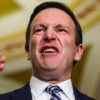Whether it’s baseball, driving or federal budgeting, rules play a central role in determining outcomes. Lower the pitching mound five inches, and baseball teams score more runs. Put too many signs on the road, and traffic accidents go up. The federal budget process is no different and, as Heritage senior fellow J.D. Foster details, the current budgeting rules are biased in favor of higher taxes and higher spending.
First enacted in 1990, PAYGO (short for pay-as-you-go) rules direct the Congressional Budget Office (CBO) to establish spending and revenue baselines from which all proposed federal tax and spending changes are to be judged. According to its lofty rhetoric, PAYGO then requires that all tax cuts and spending increases must be matched by an equal amount of tax hikes or spending cuts. The problem, as Barack Obama is finding out, is that the CBO baseline is biased in favor of higher spending and against lower taxes.
Obama plans to raise taxes on those making more than $250,000 by letting the much of the 2001 and 2003 tax cuts expire. At the same time he wants to preserve the parts of those tax cuts that benefit those making less than $250,000, and he wants to cut taxes further for select groups such as low-income workers and working seniors. The problem is that under PAYGO, Obama gets no credit for raising taxes by letting any part of the 2001 and 2003 tax cuts expire. Those tax increases are cooked into the baseline.
The Daily Signal depends on the support of readers like you. Donate now
The CBO revenue baseline assumes that tax cuts with expirations will not be renewed. On the other hand, when CBO constructs its spending baseline, it ignores statute expirations and assumes current policy will continue. So continued spending levels for temporary initiatives like farm subsidies, SCHIP and highway funding are always cooked into CBO’s baseline spending, while lower taxes like the Alternative Minimum Tax, research and development tax credit, and the 2001 and 2003 tax cuts are all assumed to expire. As Obama economic aide Austin Goolsbee told Congressional Quarterly, CBO’s double standard for spending and taxation is “completely unrealistic.”
Foster concludes: “It is said that politics makes for strange bedfellows. Perhaps to his own surprise, Obama has apparently joined forces with conservatives to correct the CBO revenue baseline. Maybe this also demonstrates that Washington is ready to have an honest debate about tax and spending policy.”
Quick Hits:
- Russian President Dmitri Medvedev claims Russia has ended its military operation in Georgia, but refuses to say when Russia will withdrawal its troops from Georgia.
- Russia is moving to claim the 90 billion barrels of oil and 1,669 trillion cubic feet of natural gas that the U.S. Geological Survey confirmed is in the Arctic Circle last month.
- Speaker Nancy Pelosi retreated from her refusal to even allow a vote on offshore drilling, telling Larry King last night: “We can do that. We can have a vote on that.“
- According to Rasmussen Reports, 64% of Americans support going ahead with offshore oil drilling.
- Standard & Poor’s lowered the debt ratings of government-sponsored entities Fannie Mae and Freddie Mac after each last week reported bigger quarterly losses than estimated.































